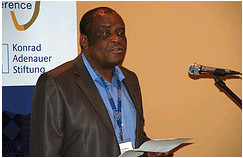
PRIMEDIA Foundation entered into a relationship with the Sol Plaatje Institute for Media Leadership to sponsor three post graduate students in media management. The scholarships, to be known as the PRIMEDIA Scholarships for African Media Leaders, are for both practicing and aspirant media managers from South Africa.
Rhodes University’s School of Journalism and Media Studies is Africa’s leading journalism school and is uniquely placed to offer high-level education and training in specific aspects of journalism to working and aspiring journalists from across the continent. The schools offerings now include a dedicated post-graduate diploma pitched at the honours degree level, which is run over a full academic year, which opens up a career path into media management.
The significance of media management is that this area of knowledge and skill is critical to the viability and sustainability of independent media in Africa and yet little has been done by media companies and universities to promote it.
The SPI, which offers a one-year, fulltime Postgraduate Diploma in Media Management (PDMM), is a unique facility in Africa. It is the only university-level institution in Africa and the developing world that runs media management-specific postgraduate training, critically the PDMM.
PRIMEDIA Skills Development
PRIMEDIA Skills Development (PSD) was a Section 21 non-profit Public Benefit Organisation (PBO) that offered vocational skills training primarily focused on the building and construction sector. The company was accredited by the Construction Education and Training Authority (CETA) to offer "legacy" skills development programmes. PSD also offered National Qualifications Framework (NQF) based skills programmes and learnerships in compliance with the requirements of the South African Qualifications Authority (SAQA).
The project was based at the Motswedi Training Centre in Alexandra, 5km from Sandton, and over the years saw the qualifying of a number of vocational experts. Training courses addressed skills such as bricklaying, carpentry, plumbing, painting and decorating, plastering, tiling and paving.
In summary, the vocational training programmes consisted of three integrated and complementary areas:
Specific competence based training using prescribed skills development programmes and NQF unit standards based programmes in a variety of vocational skills related to the building and construction industry.
Business Skills Development based on NQF unit standards for potential entry level contractors in the building and construction sector.
The provision of learnership programmes in building, civil construction and community house building.
The project experienced significant challenges during the past year, since the sector training authorities established by government to support vocational institutions have become non-operative. In view of the challenges for vocational training, PRIMEDIA handed the PSD over to the Central Johannesburg College which is responsible for vocational training. They have been partners with PSD since the inception.
The Techno-Agricultural Innovation for Poverty Alleviation (TIPA)
The Techno-Agricultural Innovation for Poverty Alleviation (TIPA) was established by the Israeli Embassy in conjunction with the JD Group. TIPA is an agricultural project which was established primarily to empower communities by granting access to Israeli-developed irrigation technology, which utilises the benefits of drip irrigation at a low cost. This enables communities to put food on the table as well as provide sustainable income for themselves.
Since then, the PRIMEDIA Foundation joined forces with various stakeholders, including the communities of Diepsloot and Randfontein, the JD Group, Johannesburg Water and Pick n Pay, to provide support for TIPA. During the past year, the PRIMEDIA Foundation built a protective facility for the Kondelelani Community Group to ensure that the crops are well looked after and protected from vandalism.
The facility was sponsored by the PRIMEDIA Foundation and built in conjunction with the PRIMEDIA Skills Development Project. This vital facility boasts showers, toilets, office space and a sheltered community area with its own fireplace. The project was formally handed over to the community in Diepsloot, and will be managed by the Kondelelani Community Group with the continuous monitoring and support from the Primedia Foundation to ensure sustainability.
Sangoni Senior Secondary School
In 2004 the PRIMEDIA Foundation and Sangoni Senior Secondary School, in the Lusikisiki District, Eastern Cape, formed a partnership. The initial support was to construct a science laboratory at the school.
Former President, Nelson Mandela, approached the Foundation to initiate the project. After the completion of the project in 2006, the agreement was to continue supporting the school by providing tertiary bursaries for the top performing male and female learners in the matric exams.
As the school is situated in the Eastern Cape, most of the students opt to register at the University of Fort Hare, Nelson Mandela Metropolitan University or Walter Sisulu University. Over the past years students have mostly selected scientific courses such as B.Sc. Agriculture, Engineering, Analytical Chemistry, etc. One student graduated with an MBCHB in 2011.
Four students graduated in 2010 in diverse fields including Agriculture, Communications, Mechanical Engineering and Commerce. Currently the Foundation is supporting three students.
